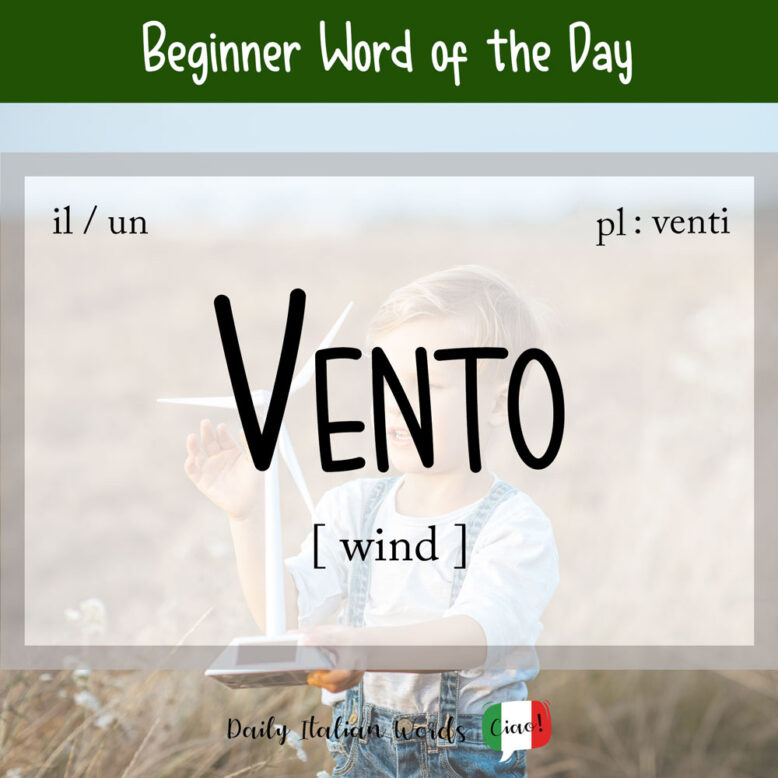The word for wind in Italian is vento (masculine, plural: venti) and it comes from the Latin term ventus.

Whereas in English, we tend to say It’s windy to describe breezy conditions, Italians have the choice between two expressions:
- Tira vento. = Lit: It’s pulling wind.
- C’è vento. = There is wind.
Caspita, c’è tanto vento oggi!
My goodness, it’s very windy today!

The adjective ventoso (windy) is only used when describing something with a windy quality such as, for example, a windy day (giornata ventosa) or a windy month (mese ventoso).
Trivia: ventosa as a noun means suction cup or sucker.
In order to say that the wind is blowing, you can use the verb soffiare (to blow).
Il vento sta soffiando a 70 chilometri orari.
The wind is blowing at 70 kilometres an hour.
Below are a few different adjectives you can use to describe wind.
- vento caldo = warm wind
- vento fresco = cool wind
- vento gelido = icy wind
- vento umido = humid wind
- vento secco = dry wind
In a figurative sense, vento can also refer to a warning sign that constitutes a pre-announcement of serious impending events, such as venti di guerra (warning signs of war) or venti di crisi (warning signs of a crisis).
A much less serious figurative meaning is flatulence. Just as we say to pass/break wind in English, you can say fare un vento (or fare dell’aria) in Italian as a euphemism for scoreggiare (to fart).
What I consider to be one of the loveliest words in Italian is venticello, which translates as soft wind or gentle breeze. The pejorative ventaccio on the other hand is used to describe strong, unpleasant winds.
A few useful terms containing the word vento include:
- giacca a vento = windbreaker
- mulino a vento = windmill
- raffica di vento = gust of wind
- vento solare = solar wind
- campanelle a vento = wind chimes
- parole al vento = empty words

Expressions containing ‘vento’
Chi semina vento raccoglie tempesta
Literal translation: Sow the wind and reap the storm
English meaning: You reap what you sow
Combattere contro i mulini a vento
Literal translation: to fight against windmills
English meaning: to fight a losing battle
Essere pieno di vento
Literal translation: to be full of wind
English meaning: to be swollen with pride
Andare dove tira il vento
Literal translation: to go where the wind blows
English meaning: to take full advantage of all circumstances
Parlare al vento
Literal translation: to speak to the wind
English meaning: to speak in vain
Buttare / Gettare qualcosa al vento
Literal translation: to throw something to the wind
English meaning: to waste something
Andare con il vento in poppa
Literal translation: to go with the wind in the stern
English meaning: to go on happily, without problems or obstacles
Qual buon vento!
Literal translation: Which good wind!
English meaning: What brings you here! (An antiquated expression used when an old acquaintance turns up unexpectedly.)
Heather Broster is a graduate with honours in linguistics from the University of Western Ontario. She is an aspiring polyglot, proficient in English and Italian, as well as Japanese, Welsh, and French to varying degrees of fluency. Originally from Toronto, Heather has resided in various countries, notably Italy for a period of six years. Her primary focus lies in the fields of language acquisition, education, and bilingual instruction.


